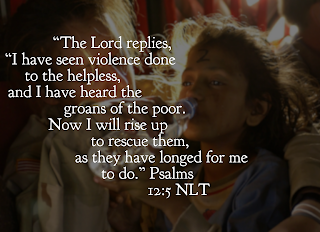God's Heart for the Suffering
Human cry provokes divine resolve
-Walter Brueggemann
Remember, dear brothers and sisters, that few of you were wise in the world’s eyes or powerful or wealthy when God called you. 27 Instead, God chose things the world considers foolish in order to shame those who think they are wise. And he chose things that are powerless to shame those who are powerful (I Corinthians 1:26-27)
Throughout the Biblical record, God reveals His Character, will, and His way to humanity and humanity seeks to respond to God's revelation. This narrative covers the distant past to the conclusion of time in the future. There are many themes that can be seen consistently through Scripture and amplified through the person of Jesus Christ. Scripture tells us that God spoke to prophets, but ultimately spoke most clearly through Jesus Christ (Heb 1:1-2). Jesus, is not a representative of God, but the "exact representation of His being". The Apostle Paul would tell the church in Colosse in the first century that "all the fullness of God" dwells in Jesus. One can conclude, that we best understand the nature of God from Jesus.
Near the end of Jesus's teaching ministry, he would share a parable about a future event that he called the great judgement. In this judgement, all of humanity would stand before him and be separated into two categories. One category to be cast out of the presence of God and the other would be rewarded by experiencing eternity in the presence of God. Interestingly, the deciding factor was not whether people could recite doctrine, or attend religious functions and rituals (although both of these things are quite beneficial), but whether the people ministered to the people whom Jesus most identified with: the poor, the hungry, the homeless, and the powerless (Mat 25:41-48). Jesus rebuked the portion of humanity who failed to see and help those who were suffering. Jesus does not accept any excuses from those who failed to bless the least, last, and the lost. Although this teaching is radical, it is nothing new and simply is a reflection of God's mercy and justice that run through the Hebrew Scriptures.
God reveals this theme in a lot of different ways:
1. God chose a special people to represent him that were "a small people" (Deut 7:7)
2. God is typically anti-empire. He actively intervenes against the Egyptian, Assyrian, and Babylonian empires and reveals that when Israel becomes an empire, it was also their downfall. He shows that human empires tend to oppress, dominant, and dehumanize its subjects.
3. Jesus is born impoverished and uses alternative language that is anti-empire. He calls people to the kingdom of God over and against the kingdom of the world. He not only identifies with the poor by ideology but by experience.
We struggle with God's love for the suffering. We seek to justify our inaction towards the poor through political ideologies, legal justifications, and cultural phobias, all while forgetting Jesus' teaching that none of those excuses will do.
Martin Luther King Jr once said "Agape does not begin by discriminating between worthy and unworthy people, or any qualities people possess. It begins by loving others for their sakes" Once we realize that we are objects of God's grace, the need to justify who is worthy of being blessed fades away. When we fail to realize our grace (unmerited favor) and accept the lie that our station in life is purely earned, then we have "privilege" that is interfering with our ability to join in the mission of Jesus.
The early church understood that it was largely made up of the poor and those of "low" social standing and that identity allowed it to minister across culture to meet need. The Apostle Paul would write that God loves to use the "powerless to shame those with power". This is continuity throughout revelation. God lifts up the humble and opposes the proud (james 4:6).
So, today in America, we have the wealthiest church in the church's history and we are awash in suffering around us. We can choose to justify our inactivity toward them, or we can accept the invitation of Jesus to identify and bless them, demonstrating to a hurting world that we are truly the followers and disciples of Jesus Christ. (John 13:34-35)
May God bless you as you fulfill your calling to be the hands of Jesus!




Comments
Post a Comment